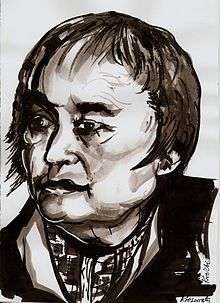Maria Janion
| Maria Janion | |
|---|---|
 Maria Janion, portrait by Zbigniew Kresowaty | |
| Born |
24 December 1926 Mońki, Poland |
Maria Janion (born 24 December 1926 in Mońki) is a Polish scholar, critic and theoretician of literature as well as a renowned feminist. She is a Professor at the Institute of Literary Research of the Polish Academy of Sciences, specialising in literary Romanticism.[1]
Janion is also a member of the Polish Academy of Learning. She has an honorary degree of the Gdańsk University. Between the years 1948-1978 she was an active member of Polish United Workers' Party.
1970s and 1980s - member of opposition
In 1970 Maria Janion joined the secret societes aimed against communism in Poland. She was one of the founders of an independent Society Of Study Courses.
She became more critical to the imposed views and values in regards to Polish literature, both old and contemporary, and to the Polish views on war, soldiers, heroism, military uprisings and martyrdom. In 1976 she published a study on war and form, discussing the recently published Private Journal of the Warsaw Uprising by Miron Białoszewski. Because she described the journal as a work that portrays war and uprising from a civil, non-mythological, non-heroic perspective, she was widely criticized. She was accused, like Miron Białoszewski, of disgracing Polish values. Her independent opinions, which were winning respect among the students and academic members, as well as her connections to the opposition, caused her to become a potential enemy of the state.
When the solidarity movement began, Janion signed the letter issued by 64 intellectuals supporting the strikes, yet calling for actions that would not contribute to bloodshed. In 1981 she made an appearance at the Congress of Polish Culture, which was interrupted by the introduction of martial law in Poland. She called for the huge national movement, which was so far mainly driven by passion, to be turned into an intellectual effort.
Romanticism as a revolution of thought
According to Janion, Romanticism is a revolution of thought which allows different insights into history, nature and humanity. She stressed that in Romanticism with time there is increasing importance of a sense of the absurd and grotesque with regard to existence, expressed in irony and melancholy.
Published works
- Gorączka romantyczna, (Romantic fever)
- Odnawianie znaczeń, (Refurbishment of meanings)
- Życie pośmiertne Konrada Wallenroda, (Posthumous life of Konrad Wallenrod)
- Wobec zła, (In view of evil)
- Żyjąc tracimy życie, (Living to lose live)
- Kobiety i duch inności, (Woman and spirit of dissidence)
- Do Europy - tak, ale razem z naszymi umarłymi
- Romantyzm, rewolucja, marksizm. (Romanticism, revolution, marxism)
- Projekt krytyki fantazmatycznej (Project of phantasmatic criticism)
- Romantyzm i egzystencja, (Romanticism and existence) with Maria Żmigrodzka, 2004
- Niesamowita Słowiańszczyzna, 2006
- Hero, Conspiracy, and Death: The Jewish Lectures, translated by Alex Shannon (2014)
References
- ↑ Gozlinski, Pawel (4 April 2011). "What they're reading in Poland". The Guardian. Retrieved 19 April 2011.